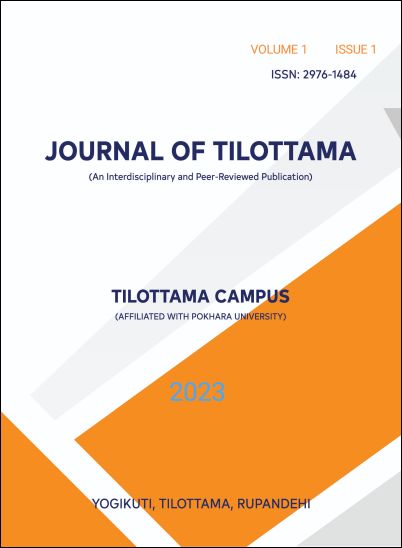Pedagogical Content Knowledge and the Nepali English Language Teacher Training
DOI:
https://doi.org/10.3126/jtilottama.v1i1.64512Keywords:
Pedagocial Knowledge, Content Knowledge, Pedagogical Content Knowledge, Teacher Education, TPD, Contents of Teacher TrainingAbstract
The paper attempts to explore the crucial role of Pedagogical Content Knowledge (PCK) within the realm of English language teacher training in Nepal. PCK serves as a vital bridge between teachers’ Content Knowledge (CK) and Pedagogical Knowledge (PK), facilitating effective teaching practices and enhancing student learning outcomes. The study examines the interconnectedness of PK, CK, and PCK, with the aim of improving the quality of teacher preparation programs and ultimately, the English language education system in Nepal. Through an extensive literature review, the research establishes a theoretical foundation, examining the conceptual framework of PCK and its significance in teacher education. It identifies existing gaps and challenges in current Nepalese English language teacher training practices, emphasizing the need for the seamless integration of PK, CK, and PCK in classroom instruction. The paper concludes that the contents of the teacher education and training programs differed from what the experts thought should be given. The broader areas of subject matter become narrower in the TPD program in Nepal. However, the nature of the programs is also responsible for the type of content being tried to be imparted to the English teachers. The research identified various factors influencing the successful implementation of PCK in teacher training. These included limited emphasis on PCK in the curriculum, time and resource constraints, and a lack of alignment between teacher education institutions and school practices. The findings underscored the importance of curriculum reforms and the provision of ongoing professional development opportunities to strengthen PCK integration.
Downloads
Downloads
Published
How to Cite
Issue
Section
License
Copyright (c) 2023 Tilottama Campus

This work is licensed under a Creative Commons Attribution-NonCommercial 4.0 International License.
This license enables reusers to distribute, remix, adapt, and build upon the material in any medium or format for noncommercial purposes only, and only so long as attribution is given to the creator.




